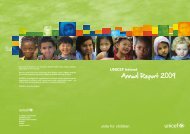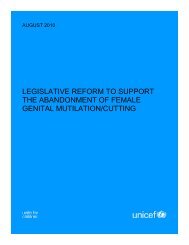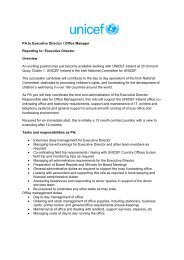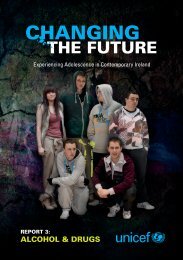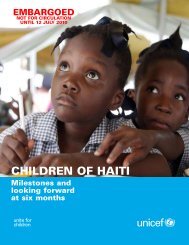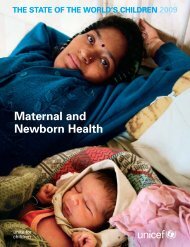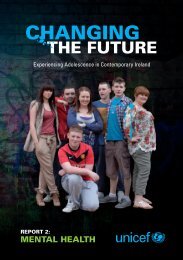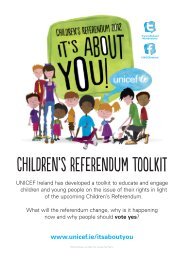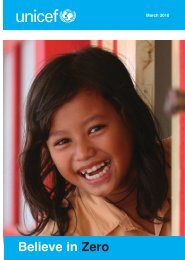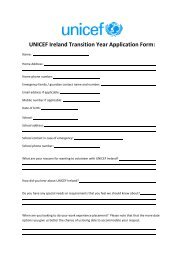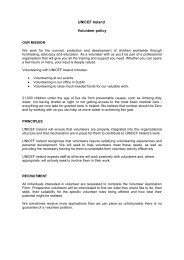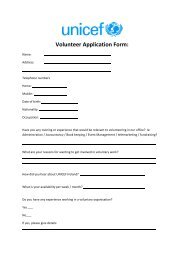Humanitarian Action for Children 2011 - Unicef
Humanitarian Action for Children 2011 - Unicef
Humanitarian Action for Children 2011 - Unicef
- No tags were found...
Create successful ePaper yourself
Turn your PDF publications into a flip-book with our unique Google optimized e-Paper software.
Occupied Palestinian Territory<strong>Children</strong> and women in crisisSuccessive waves of violence caused by prolonged Israeli military occupation have chippedaway at the living conditions in the Occupied Palestinian Territory, leading to psychologicaldamage, poverty and lack of such essentials as health services, safe drinking water, sanitationand education. As the Israeli blockade of Gaza enters its fourth year, serious humanitarianconsequences continue <strong>for</strong> the 1.5 million people – at least half of them children – who livethere. In the West Bank, the intrusive barrier, which when complete will be over 700 kilometreslong, restricts access to land, water and education <strong>for</strong> thousands of children, while restrictionson movement affect the total population of 2.4 million. Distressing effects of settler violenceand <strong>for</strong>ced displacements are manifest among Palestinians, particularly children.<strong>Humanitarian</strong>funding at work:Highlights from 2010In 2010, UNICEF estimatedthat US$24,247,910 wasneeded to fund its humanitarianwork in the OccupiedPalestinian Territory. Asof October 2010, a total ofUS$9,794,657 had beenreceived, or 40 per cent ofthe goal. UNICEF used thesefunds to improve access tosafe water and sanitation<strong>for</strong> roughly 131,000 people,including 101,000 children.Protection and psychosocialservices helped strengthencoping skills of more than70,000 children and 36,000caregivers in Gaza; groupand individual counsellingbenefited an additional5,000 children and 1,800caregivers. To addresshealth concerns, includingmicronutrient deficits,UNICEF helped educate 7,500mothers in infant feedingpractices and providedemergency polio vaccinesto 42,000 children. Catch-upschool sessions havebenefited around 19,000children whose educationhas been disrupted orstalled, and around 35,000adolescents participated inafter-school learning andrecreational activities.Meeting urgent needs and building resilience in <strong>2011</strong>UNICEF leads the WASH and education clusters, the child protection sub-cluster and theMonitoring and Reporting Working Group on grave violations against children in Israel andOccupied Palestinian Territory. The organization also contributes to the health, food securityand nutrition clusters. Together with the government, other UN agencies and NGOs, UNICEFplans to use funds gathered <strong>for</strong> <strong>2011</strong> to improve the prospects of 1.5 million women andchildren.• 311,000 mothers will be reached through counselling and awareness-raising on exclusivebreastfeeding and adequate micronutrient supplementation in order to reduce nutritionaldeficiencies among infants and pregnant women.• Hospitals and primary health-care centres will be provided with life-saving medical equipment,and families will benefit from early interventions and improved knowledge on caring <strong>for</strong>infants in crisis. This will help provide better care <strong>for</strong> around 50,000 high-risk newborns.• 207,000 people (including 144,000 children) will have access to safe water and sanitationthrough five newly installed desalination plants and through emergency repairs of water andsewage networks. UNICEF will distribute water to 80 primary schools and rehabilitate WASHfacilities in 55 schools.• 210,000 children will have improved access to basic education when UNICEF facilitatestransportation, supplies and learning material <strong>for</strong> affected schools, and gives support toremedial and recreational programmes. Access to alternative learning opportunities will beprovided to 13,500 children aged 10–18, who are at risk of dropping out.• To mitigate the impact of violence and armed conflict on children, 310,000 children and20,500 older children aged 10–18 will receive child protection and psychosocial support, and95,000 caregivers and volunteers will be mobilized in child protection networks.Funding requirements <strong>for</strong> <strong>2011</strong>UNICEF is requesting US$18,759,000 <strong>for</strong> its <strong>2011</strong> humanitarian work to achieve the objectivesstated above. UNICEF has aligned its request with the <strong>2011</strong> Consolidated Appeals Process (CAP)requirements, with additional monies requested in the health sector to cover pressing needs.More in<strong>for</strong>mation on 2010 results and humanitarian action planned in <strong>2011</strong> can befound at www.unicef.org/hac<strong>2011</strong> or the country office website at www.unicef.org/oPt.1,023,000HealthUNICEF EMERGENCY NEEDS FOR <strong>2011</strong> (in US dollars)Total $18,759,0004,892,000 Child protection2,080,000Cluster coordination1,403,000Nutrition5,079,000 WASH1,917,000Education2,365,000Adolescents50 <strong>2011</strong> UNICEF <strong>Humanitarian</strong> <strong>Action</strong> FOR CHILDREN | www.unicef.org/hac<strong>2011</strong>Occupied Palestinian Territory (OPT)




